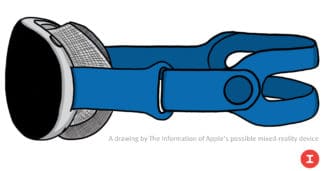Apple’s AR/VR headset may be delayed to later next year.
TF International Securities analyst Ming-Chi Kuo is known for predicting Apple products & moves over a year in advance using his supply chain sources. Apple Track gives him a 72.5% accuracy rating.
Last year Kuo claimed Apple’s headset will launch in late 2022, as did Taiwanese news outlet DigiTimes. The Information had originally reported on this 2022 launch plan back in 2019, and Bloomberg’s Mark Gurman in 2020. But in January of this year, Gurman reported the product was delayed into 2023 due to “challenges related to overheating, cameras and software”, and in June Kuo claimed it would launch around June 2023.
But Kuo now claims the headset has been delayed even further, to the second half of 2023 due to “software-related issues”. Kuo says he now estimates just 500,000 units to be shipped by the end of next year, compared to previous estimates of 750,000 units.

The Information and Bloomberg have previously reported the product will be priced between $2000 and $3000.
In August an Apple-linked company filed to trademark ‘Reality One’, ‘Reality Pro’, and ‘Reality Processor’, suggesting the headset and its processor will be branded Apple Reality.
Earlier in the year, an Apple-linked shell company trademarked RealityOS, and references to realityOS were found in App Store upload logs and Apple code. Bloomberg reported Apple is working on a realityOS (rOS) client for FaceTime with face tracking for driving Memoji avatars, a VR version of Maps, spatial versions of Notes and Calendar, the ability to view a Mac’s display in-headset, and AR/VR tools for developers.
Kuo claimed it will weigh noticeably less than current VR headsets and feature high resolution OLED microdisplays, while The Information has claimed it will be powered by the M2 chip seen in the latest MacBooks and feature hand tracking, eye tracking, face tracking, leg tracking and iris scanning for logins and payments.
So if the reports so far are to be believed, Apple’s product will have higher resolution, a more powerful processor, more features, and a slimmer design than Meta’s Quest Pro – though at a higher price. And given Meta reportedly plans a successor for 2024, Apple’s headset might spend more of its lifecycle competing against Quest Pro 2, which might feature OLED microdisplays and a faster chip too.




